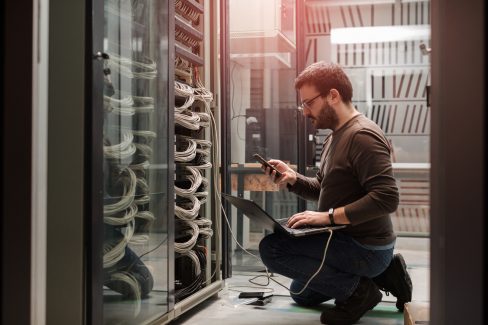Updated: October 30, 2018 (Originally Posted: April 4, 2015)
Now known as the Fourth Industrial Revolution, the rise of AI and machine learning is expected to dramatically affect the IT sector and the wider global economy. 85% of the jobs people will have by 2030 – just 12 years away – don’t even exist yet. Trends such as software-defined networking and automation in manufacturing are changing the workforce, education, and requisite job skills every day. How can engineers prepare themselves for the transition?
The Future of Network Engineering
 There is a trend in today’s data centers, from a network fabric perspective, to remove the possibility for human error by having pre-defined application network profiles deployed directly onto a stateless network fabric. Cisco’s Application Centric Infrastructure (ACI) and VMWare’s NSX are great examples of Software Defined Networking that have the ability to automatically push a best practice configuration down to the network construct in seconds.
There is a trend in today’s data centers, from a network fabric perspective, to remove the possibility for human error by having pre-defined application network profiles deployed directly onto a stateless network fabric. Cisco’s Application Centric Infrastructure (ACI) and VMWare’s NSX are great examples of Software Defined Networking that have the ability to automatically push a best practice configuration down to the network construct in seconds.
Cisco is working with Oracle and SAP to co-develop Application Network Profiles so that IT departments within organizations know they have a clean best practice configuration deployed on their network construct. A good analogy to this is reference architectures like VBlock, FlexPod and SmartStack, but for the actual network architecture itself. A Microsoft executive recently stated “Manual Configuration and manual errors are a show stopper at the data center scale so programmability and automation are really critical.”
This is an inevitable trend and the next area will be to really remove some complexity and speed deployments. Forward thinking network engineers will acknowledge this fact and stay well-versed and prepared for this eventual shift when the time comes.
Addressing the Fear
 In her article entitled Network Engineers: Don’t Fear the Code, Lori MacVittie emphasizes the need for engineers to embrace this trend, and she explains that using this form of automation does not mean they will no longer have jobs. Engineers will just need to adapt. The author points out,
In her article entitled Network Engineers: Don’t Fear the Code, Lori MacVittie emphasizes the need for engineers to embrace this trend, and she explains that using this form of automation does not mean they will no longer have jobs. Engineers will just need to adapt. The author points out,
“In particular, engineers are concerned they may be required to, well, code (rightly so, given phrases like “infrastructure as code”). They’re concerned about the skills and skill sets they need that they may not have. Continuous delivery is slowly but surely pushing its way outside of dev and ops and into the network, and seems destined to push code along with it as well.”
Network engineers need to realize that nothing is permanent, and change/improvements are inevitable. Network engineers will always have a critical place in IT, but in the future this may just be via a slightly different medium. MacVittie hits on this point well: “Does that require some new skills? Perhaps. But it leverages existing ones, too, and relies on the knowledge and skills network engineers already have. After all, someone has to know how to block traffic on port 8080 on (insert favorite vendor here) switching infrastructure before it can be scripted and automatically deployed.”
What Can Be Done
Change is scary, especially automation, when the question of job security is hanging in the balance. The best way engineers can approach this is to recognize and embrace these changes, learn new skills, and work on adapting our critical foundational skills to stay valuable in a competitive marketplace. As MacVittie says, “Don’t fear the code.”
Mindsight Can Help
Clients leverage the wide experience and up-to-date knowledge base of Mindsight engineers to design and deliver the latest in IT infrastructure and communications systems to business users without risk to production systems. We act as a support and escalation resource for unique system issues. Managing the challenges of day to day operational demands, as well as the time investment and risk associated with learning and deploying the latest technologies make Mindsight engineers a cost effective and convenient extension of your in-house team.
Lori MacVittie is a subject matter expert on cloud computing, cloud and application security, and application delivery and is responsible for education and evangelism across F5’s entire product suite. MacVittie has extensive development and technical architecture experience … View Full Bio
Like what you read?
About Mindsight
Mindsight, a Chicago IT consultancy and services provider, is an extension of your team. Our culture is built on transparency and trust, and our team is made up of extraordinary people – the kinds of people you would hire. We’ve always prided ourselves in delivering the full spectrum of IT services and solutions, from design and implementation to support and management. Our highly-certified engineers and process-oriented excellence have certainly been key to our success. But what really sets us apart is our straightforward and honest approach to every conversation, whether it is for a local business or global enterprise. Our customers rely on our thought leadership, responsiveness, and dedication to solving their toughest technology challenges.


